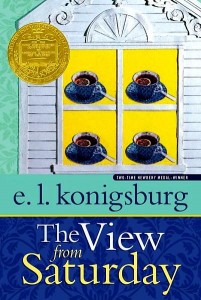The beauty of Koningsburg prose was how acutely she captured the aches and pains of being an outsider, a loner, a kid that was a little different. There’s something particularly middle-grade about that, I think, the aches and pains of not just figuring out who you are but understanding that who you are is a little different … and that’s OK. In her best books, there are both costs and rewards for these differences, it’s no simple change or choice.
When you hear her name I suspect, like most people, you think of the classic From the Mixed-Up Files of Mrs. Basil E. Frankweiler – the 1967 Newbery winner roundly considered one of the definitive works of children’s literature. This is one of those books that was simply always in my life. It was one of the books in our home and a book I remembered seeing my older sister read time and again. When it was finally my turn to read it (I was probably around 9) I was so excited I could barely stand it. And … I totally failed to connect with it.
I liked it, I guess, but even at 9 years old it seemed so … well, it seemed unbelievable to me. Nothing happening in that book felt real to me. Which, don’t get me wrong, I loved fantasy books (though, honestly, as a child reader, I liked realistic fiction more than fantasy) but Mrs. Basil E. Frankweiler wasn’t fantasy. Of course, I realize now as an adult it’s a work of magical realism, fantasy of a sort. It doesn’t have to be rooted in the realism of “yes, but in actuality children couldn’t…” because it’s about possibilities and dreams.
Of course I know that now. And now I can see what a lovely book Mrs. Basil E. Frankweiler is – how all the pieces fit together, how it is an exemplary example of craft. I know all that. But lo these 25+ years later, I still cannot connect with it.
And so, perhaps, that would be that: not worth noting, even upon Konigsburg’s death: newsflash: a Newbery winner and classic one person doesn’t really connect with! But, for me, that’s not just that.
Because in 1996 (the year I graduated from high school, my last year as an official “child”) Konigsburg wrote The View from Saturday, which became her second Newbery winner. Three summers later, as my life fell apart around my ears and I failed out of college, I came home to work and try to sort my life out by returning to my high school after school job. That job was at the local public library and I ended up sorting my life out, changing the path of my life, through children’s literature. Four books made this change in me: Lloyd Alexander’s The Book of Three, Jerry Spinelli’s Crash, Rob Thomas’s Rats Saw God, and E.L. Konigsburg’s The View from Saturday.
Every voyage begins when you do.
The View from Saturday, like Basil E. Frankweiler, is staggeringly well-constructed; all the pieces click in just the right ways, there’s suspense but also a clear line tying it all together. It’s a narrative where seeing all the pieces slowly fit together isn’t just a marvel, it’s a pleasure. Plot-wise, The View from Saturday is a set of interlocking stories about a group of sixth graders brought together by their teacher who is struggling to return to teaching after an accident to be an unlikely quiz bowl team.
 But it’s so much more than that: it’s a book about surviving the cruelty of middle school by creating friendships and uniting together in doing what’s right. It’s a book about realizing that the truest moments of growing up happen when we have to choose between selfish pettiness and open hearts. The View from Saturday is about kindness, yes, maybe kindness most of all. But it’s also about the miracle of every connection in our life, how every moment is a chance to reach a hand out to someone and say, “Can I help? Can I listen? Can I stand by you? Can I be part of your story?”
But it’s so much more than that: it’s a book about surviving the cruelty of middle school by creating friendships and uniting together in doing what’s right. It’s a book about realizing that the truest moments of growing up happen when we have to choose between selfish pettiness and open hearts. The View from Saturday is about kindness, yes, maybe kindness most of all. But it’s also about the miracle of every connection in our life, how every moment is a chance to reach a hand out to someone and say, “Can I help? Can I listen? Can I stand by you? Can I be part of your story?”
In a sad, hard time in my life – E.L. Konigsburg, the Souls, held out a hand to me. My voyage began when I was ready, it began, as she’d promised, when I did.
This is the eternal gift we’re left with from E.L. Konigsburg’s work – we’re all a little different, her work said, we’re all looking for something. And, when you’re ready to speak (Silent to the Bone), to stand up (The Outcasts of 19 Schuyler Place), to have an adventure beyond belief (Up from Jericho Tel), to tell your history (A Proud Taste for Scarlet and Miniver), your voyage can begin.
I know now, Mrs. Olinski, librarianship chose me as a much as I chose it.
I know now, Mrs. Frankweiler, the secret.
Thank you, E.L. Konigsburg: thank you, thank you, thank you.
—
via Bookshelves of Doom, here’s a great round-up of remembrances.


